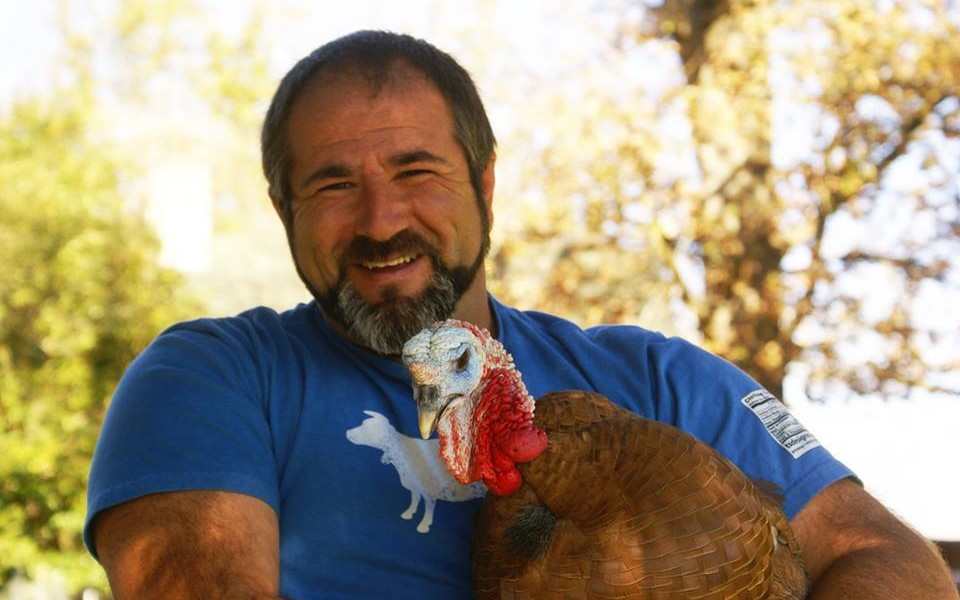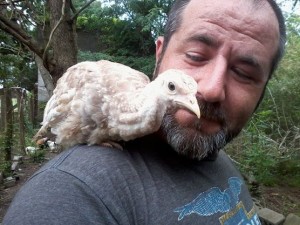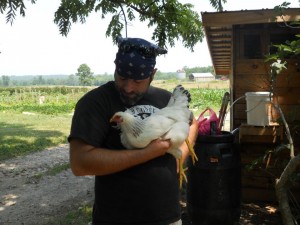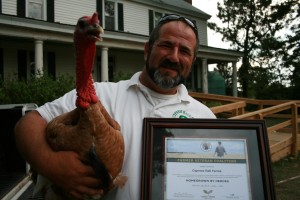As a kid, Robert Elliott hated farming. When he left home to join the Marine Corps at 18, he never thought he’d make his way back to his aunt and uncle’s North Carolina farm to take on the job full-time.
“I thought it was kind of a thankless job, which in many ways it is,” said Elliott.
But after five years as a Marine, ten more as a contractor and a brief stint studying engineering at North Carolina State University, Elliott is back on that same farm in Louisburg. Today he’s growing good food for his local community and working to educate consumers about the importance of sustainable agriculture. He couldn’t imagine a better career.
“I want these animals to have a wholesome life. I want them to be as happy as they can be.”
Cypress Hall Farms, run by Elliott on his family’s land, is a fairly new venture to foster organic, antibiotic-free and free-range products on farmland that dates back to the 1700s. A few years ago during a battle with breast cancer, Elliott’s aunt had to relinquish parts of her farm, leasing out most of the 850 acres she owned. When Elliott took over the neglected land last year, he decided to use his new knowledge to reshape 80 acres into a haven for healthy food and happy animals.
“I want these animals to have a wholesome life. I want them to be as happy as they can be, “said Elliott. “A lot of the things that they put in food and livestock these days… you can’t even pronounce them unless you have a master’s degree in chemistry.”
While studying at North Carolina State, Elliott worked part-time on the farm and did some extra reading on the side. He picked up a book by Joel Salatin, a farmer, lecturer and author whose work includes Folks, This Ain’t Normal and You Can Farm. Salatin’s work shattered Elliott’s perspectives on agriculture, and led him to start reimagining the family’s farm.
“This is something I could do,” Elliott thought as he read page after page of Salatin’s book, “because I really liked our chickens in the backyard. I quit going to NC State. I ordered 100 chickens without any idea where I was going to go with it.”
Now, Cypress Hall Farms has taken on turkeys, pigs, rabbits, ducks and vegetables, with hopes to add cattle and lamb soon. In just one year, Cypress Hall Farms has achieved notable success and growth, selling chickens faster than they can produce them. Elliott hopes the farm will become self-sufficient again within the next few years, no longer relying on tenants who lease the extra land.
Like many of North Carolina’s farms, Elliott’s land has a history of tobacco production. Today, he wouldn’t consider getting involved with that crop.
“Who knows what’s going to happen with tobacco? I decided to invest in a business that’s a necessity – that’s food. And that’s paid off for us,” said Elliott.
As a farm transitioning from tobacco production to innovative agriculture strategies, Cypress Hall Farms earned a grant from the Tobacco Communities Reinvestment Fund (TCRF), a division of Rural Advancement Foundation International (RAFI) for chicken processing equipment. This has helped them to expand and overcome some of the expenses and obstacles of rehabilitating the family farm.
Without the help of Elliott’s wife Michelle, his extension agent Martha Mobley, two godsons Layne and Cole Franks, stepsons Joshua and Shawn, and his friend Scot Greevy, Cypress Hall Farms wouldn’t be a reality. Michelle works as a nurse three days a week, but tends to all of the organic produce in her spare time. Together the entire family has committed themselves to providing healthy food for local consumers.
“The mission of Cypress Hall Farms is to feed everyone with something,” said Elliott. “We don’t want to be a specific niche market. We don’t want to be selling foods with a huge markup because we’re after big money. We’d rather reach out to everyday folks and always have something for everyone to be able to buy from us.”
Elliott sells his food at two local farmers markets about 40 miles outside of Raleigh: the Wilson Farmers Market and Rocky Mount Farmers Market. Here, many did not understand the benefits of grass-fed and organic before Elliott brought his products to them.
“For them, everything came from the grocery store, we had to educate so many people. Once we did educate them, it just paid off tenfold for us,” said Elliott.
Cypress Hall Farms also educates customers through agritourism. Anyone can come take a walk around the farm, seeing the chickens and pigs while also learning about the benefits of free range and antibiotic-free livestock.
“We always do farm tours for people who want to see where their food comes from. We’re a huge proponent of ‘if you’re not going to buy from me, at least inspect the farm that you are going to buy from,'” said Elliott. “We would rather people know 100 percent where their food is coming from and be comfortable with what they’re buying from us, and I think that’s really paid off for us.”
But Elliott doesn’t stop at educating his customers. As a former Marine, he’s earned the “Homegrown by Heroes” certification for his products from the Farmer Veteran Coalition – an initiative that identifies food produced by former military personnel. He feels more comfortable on his land than in a cubicle, and thinks that working on the farm provided him the best transition out of the military life.
Now, he wants to help transitioning veterans find jobs in agriculture. He’s developed the beginning stages of an incubator farm called The Veteran’s Farm of North Carolina that would allow veterans to spend a year or more on a farm where they learn to grow, harvest and market products before starting their own farms or working elsewhere in agriculture. Until The Veteran’s Farm is established, he’ll take any veteran who’s interested in sustainable agriculture onto his own land and show them what he has learned so far.
“There’s too many farms drying up and blowing away. Two percent of Americans are doing the farming – a small percentage of Americans are also veterans,” Elliott said. “Why not move veterans into the two percent whose work is dying out?”
Cypress Hall Farms has changed Elliott’s outlook on food and life, and he hopes to bring similar solutions to struggling veterans as they transition back to the civilian world. It’s not easy to change careers or restore a farm, but he’s found the process rewarding both financially and personally.
“Doing everything I do on the farm is therapeutic for me,” said Elliott. “Everything that I’ve done in my time with the military has been to destroy life in one way or another. Everything I do now is to nurture it.”
Further Reading
- Read “A New Farm Economy Rises from Tobacco’s Ashes” to learn more about North Carolina’s long history of tobacco growing, how that market crashed, and how resourceful farmers like Robert have made the transition to growing healthy food.






